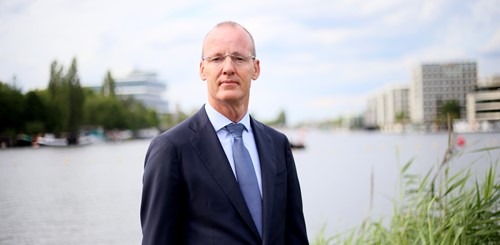"The waves of the economic cycle come and go. All insurers can do is learn to surf. And pay close attention to the color of the flags on the beach." This is what Klaas Knot, President of DNB (De Nederlandsche Bank), said during the Association Day 2023 that the Association organised yesterday.
Knot was invited as keynote speaker and presented the full house with an economic weather report. Bottom line? "That insurers still have to take into account quite high waves for the time being, in the form of high inflation and higher interest rates."
Is that the motto? Learn to surf to brave the waves?
"The founder of mindfulness (Jon Kabat-Zinn) once said: You can't stop the waves, but you can learn how to surf. He meant that you are not completely in control of what comes your way, but how you react to it. For me, there is an economic truth in that statement."
In your speech you also talk about coloured flags on the beach. Are they all red?
"No, there is also a flag for the cooling growth. As far as I'm concerned, it turns yellow. The services sector in particular is still growing at the moment. The government's substantial deficit also contributes to this growth. With its loose fiscal policy, the government contributes to overheating the economy, which certainly does not help the fight against inflation. In addition, there is a green flag for unemployment. There are historically a lot of people at work. And yet there are still five vacancies for four unemployed people. By the way, the inflation flag is of course bright red."
"There are historically a lot of people working. And yet, compared to four unemployed, there are still five vacancies."
That inflation is high. And persistent. What can be done about it?
"Good question. The past few years have been another lesson in humility for me. The unpredictability of external developments is great. Also for the Governing Council of the ECB that I sit on. Inflation has been dangerously low for years. There was even a threat of deflation. Every six weeks we performed a rain dance in that Governing Council for more inflation. Then came corona. And after we had corona behind us, a war broke out right on our doorstep. Suddenly, inflation came pouring down from heaven. Just two weeks ago, the ECB decided to raise interest rates again, this time by 25 basis points. And if necessary, the ECB will continue to raise interest rates, but that interest rate policy is at the service of the entire Eurozone. The aim is consumer price inflation of two percent in the medium term. However, it is an illusion to think that it will really be two percent in all twenty member states."
Interest rates will rise slightly to dampen inflation in Europe, but there is a good chance that it will turn out higher in the Netherlands. Why is that?
"Our economy is overheated. More than the countries around us, we are struggling with too much demand and too little supply. As a result, the price and wage pressures are also higher for us. In 2019 we were already experiencing this overheating, but strangely enough we have come out of the crises better than we expected. In other words, we are more resilient than we think and can adapt well. The foundation of our economy is really rock solid."

DNB President Klaas Knot (Photography: DNB)
If the ECB's interest rate hikes are not enough for our country, what can DNB do?
"We could perhaps tighten supervision further, which would further restrict the lending of Dutch banks, but frankly we do not have any really suitable instruments. We are genuinely dependent on our communication and persuasion. Inflation is most effectively controlled when central banks, governments, employers and employees work together."
You are referring to the wage demands of the trade unions?
"Wage negotiations do indeed play an important role, as do profit margins. We have been using our communication and persuasion for some time to convince the social partners not to opt too much for the short term. We really need to avoid falling into a wage price spiral. If we want to avoid unnecessarily high inflation, companies and trade unions must achieve controlled growth. Both of profits and wages. 2022 was the year of profits. The unions believe that 2023 should be the year of wages. Then I would argue that 2024 will be the year of the balance sheet again."
"We really need to avoid falling into a wage price spiral"
Finally, what do the forecasts for inflation look like?
"According to our estimates, we have had the worst peak and inflation in our country will first fall to 4.2 percent in 2024 and then further to 2.5 percent in 2025. But that's overall inflation. The so-called core inflation, which excludes energy and food prices (which even rose to 8.2 percent in May), is a lot more persistent. This will remain considerably too high in 2023 and 2024, and will probably still be well above two percent in 2025. That's not a nice message. Insurers can't control those waves, but they do. They can be alert to the cost. Manage interest rate risk well. And keep a close eye on the potentially vulnerable investment portfolio. I hope that insurers will contribute to a stable, safe and future-proof sector while surfing."
Was this article useful?
